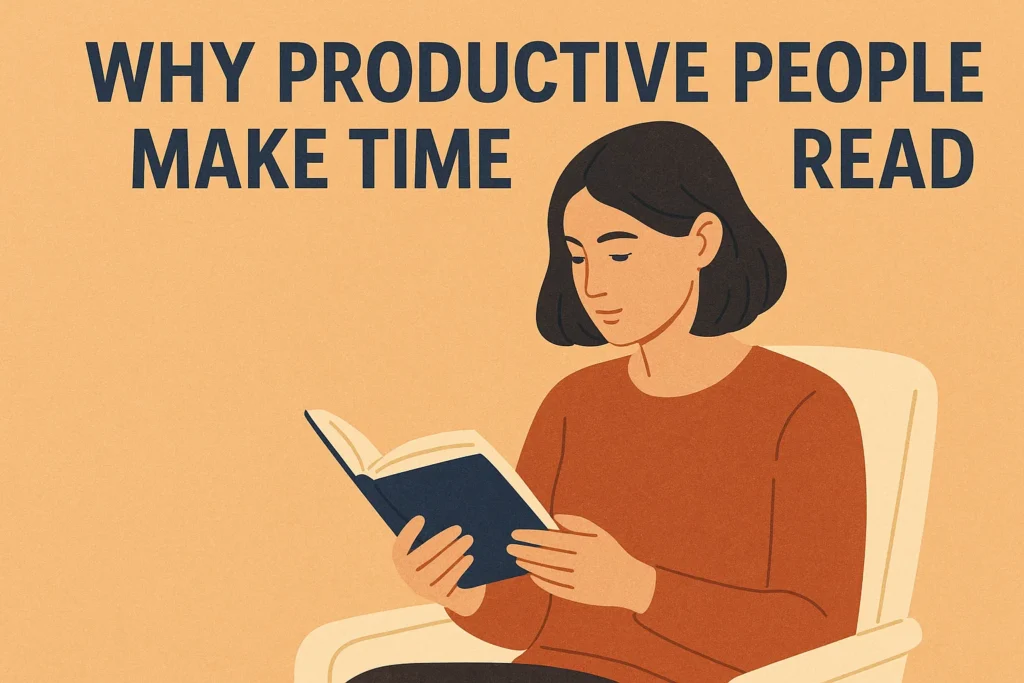In a fast-paced world dominated by deadlines, digital distractions, and endless to-do lists, carving out time to read might seem like a luxury. However, the most successful and efficient individuals consistently make reading a priority. You might wonder, why do they do it? The answer lies in the very foundation of their productivity. Why productive people make time to read goes far beyond simple leisure—it’s a strategic habit that nurtures the mind, sharpens skills, and fosters long-term success.
Reading: A Tool for Mental Growth
Productive people understand that their greatest asset is their mind. Just like physical exercise strengthens the body, reading strengthens the brain. Engaging with books, articles, and essays challenges cognitive abilities, enhances comprehension, and promotes analytical thinking.
When high achievers read regularly, they’re not just accumulating information—they’re cultivating mental agility. Whether it’s a book on leadership, a biography of a great innovator, or a philosophical essay, reading allows them to explore new perspectives and apply them creatively in real-world scenarios. This intellectual stimulation helps them make better decisions, solve problems more effectively, and adapt to changes swiftly.
The Power of Focus and Deep Work
In his best-selling book Deep Work, author Cal Newport argues that the ability to focus without distraction is a superpower in today’s economy. Reading trains this very skill. When someone immerses themselves in a book, they practice sustained attention—something many struggle with in our digital age.
This is a major reason why productive people make time to read. It’s not just about the content—they value the act of deep focus itself. Regular reading helps them build mental stamina, which then translates into increased concentration in other areas of life. This focused mindset enhances their productivity at work, in personal projects, and in strategic planning.
Lifelong Learning and Adaptability
The world is changing faster than ever, and staying relevant requires constant learning. Productive people know that stagnation is the enemy of growth. Reading enables them to stay updated with trends, technologies, ideas, and global issues.
They don’t limit themselves to one genre. Instead, they explore a wide range of topics—from psychology and technology to history and economics. This variety fuels their creativity and helps them make innovative connections across disciplines.
Learning through reading is self-directed, low-cost, and incredibly effective. It equips them to lead teams better, develop new skills, and pivot their strategies when necessary. This commitment to lifelong learning is at the heart of their success.
A Daily Ritual that Promotes Discipline
Successful people often attribute their achievements to solid routines. Reading is one such habit that instills consistency and discipline. By making reading a daily ritual—whether it’s 15 minutes in the morning, during a commute, or before bed—they reinforce structure in their lives.
Moreover, this habit becomes a powerful signal to their subconscious: self-growth matters. It’s a small, repeated action that builds momentum and fosters a sense of achievement. Even on chaotic days, a few pages of reading help them reconnect with their goals and stay centered.
Understanding why productive people make time to read means recognizing that it’s not about having time—it’s about making time because the rewards far outweigh the effort.
Stress Reduction and Mental Well-being
In the midst of constant hustling, productive people are also mindful of their mental health. Reading is a scientifically proven way to reduce stress. A study by the University of Sussex found that reading for just six minutes can lower stress levels by up to 68%.
By diving into a compelling story or exploring inspirational nonfiction, individuals momentarily disconnect from their pressures. This mental break can rejuvenate them, reduce burnout, and improve emotional balance.
Reading also fosters empathy and emotional intelligence, especially when engaging with literature that delves into human emotions, relationships, and experiences. These qualities are invaluable in both leadership and interpersonal communication.
Reading Fuels Better Communication
No matter the field, productive people understand the importance of effective communication. Reading enhances vocabulary, improves sentence structure, and exposes readers to various styles of expression. Over time, this translates into clearer emails, more persuasive presentations, and stronger conversations.
Whether they’re writing proposals, leading meetings, or negotiating deals, their reading habit gives them a distinct edge. It helps them articulate ideas better, listen actively, and engage in meaningful dialogue—all crucial traits of high-performing individuals.
This communication advantage is another key reason why productive people make time to read—they know that words are powerful tools that can open doors and influence outcomes.

Building a Vision for the Future
Reading allows individuals to see beyond their immediate surroundings. It introduces them to new philosophies, global cultures, future trends, and timeless wisdom. Visionary leaders often credit books with shaping their long-term strategies and inspiring their missions.
From Elon Musk to Oprah Winfrey, some of the most productive minds on the planet have credited reading with expanding their vision. It’s through books that they find mentors, develop principles, and gain insights that others may overlook.
In essence, reading is not just about the now—it’s about the next. It fuels the imagination and helps readers see the bigger picture.
Role Models Who Read
If you still wonder why productive people make time to read, just look at those at the top:
- Warren Buffett reads 5-6 hours daily and once said, “Read 500 pages like this every day. That’s how knowledge builds up, like compound interest.”
- Bill Gates reads about 50 books a year and calls reading “his favorite way to learn about a new topic.”
- Barack Obama has spoken openly about how reading helped him stay grounded during his presidency.
These role models don’t read because they have extra time—they make time because they know it sharpens their edge.
How to Start Your Own Reading Habit
Inspired to follow in their footsteps? Here are a few tips to cultivate your own reading routine:
- Start small – Commit to 10-15 minutes a day.
- Choose books you enjoy – You’re more likely to stay consistent.
- Keep a book handy – Use spare moments during commutes or breaks.
- Make it a ritual – Attach reading to a part of your daily routine (like before bed).
- Mix formats – Audiobooks and eBooks are great alternatives for busy days.
- Track your reading – Apps like Goodreads can help you stay motivated.
- Share insights – Discuss what you read with others to deepen understanding.
Final Thoughts
The answer to why productive people make time to read is rooted in the transformative power of reading. It’s not just a hobby—it’s a productivity tool, a stress reliever, a source of knowledge, and a gateway to personal and professional growth.
By dedicating even a small portion of their day to reading, productive people unlock creativity, improve focus, enhance communication, and continuously evolve. If you aspire to be more effective, resilient, and visionary, start with a simple habit: pick up a book.
In a world obsessed with speed, reading reminds us to slow down, reflect, and grow. That’s not a detour from productivity—it’s the very path to it.
Read More Effective Time Management Strategies
See More Blueprint for Green Growth


1 Comment
Solid points all around.